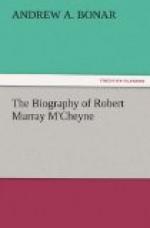In the beginning of the year he published his Daily Bread, an arrangement of Scripture, that the Bible might be read through in the course of a year. He sought to induce his people to meditate much on the written word in all its breadth. His last publication was, Another Lily Gathered, or the account of James Laing, a little boy in his flock, brought to Christ early, and carried soon to glory.
In the middle of January 1843, he visited Collace, and preached on I Cor. 9:27: “A Castaway”—a sermon so solemn that one said it was like a blast of the trumpet that would awaken the dead. Next day he rode on to Lintrathen, where the people were willing to give up their work at mid-day, if he would come and preach to them. All this month he was breathing after glory. In his letters there are such expressions as these: “I often pray, Lord, make me as holy as a pardoned sinner can be made.” “Often, often I would like to depart and be with Christ—to mount to Pisgah-top and take a farewell look of the church below, and leave my body and be present with the Lord. Ah, it is far better!” Again: “I do not expect to live long. I expect a sudden call some day—perhaps soon, and therefore I speak very plainly.” But, indeed, he had long been persuaded that his course would be brief. His hearers remember well how often he would speak in such language as that with which he one day closed his sermon: “Changes are coming; every eye before me shall soon be dim in death. Another pastor shall feed this flock; another singer lead the psalm; another flock shall fill this fold.”
In the beginning of February, by appointment of the Committee of the Convocation, he accompanied Mr. Alexander of Zirkcaldy to visit the districts of Deer and Ellon—districts over which he yearned, for Moderatism had held undisputed sway over them for generations. It was to be his last evangelistic tour. He exemplified his own remark, “The oil of the lamp in the temple burnt away in giving light; so should we.”
He set out, says one that saw him leave town, as unclouded and happy as the sky that was above his head that bright morning. During the space of three weeks, he preached or spoke at meetings in four-and-twenty places, sometimes more than once in the same place. Great impression was made upon the people of the district. One who tracked his footsteps a month after his death states, that sympathy with the principles of our suffering church was awakened in many places; but, above all, a thirst was excited for the pure word of life. His eminently holy walk and conversation, combined with the deep solemnity of his preaching, was specially felt. The people loved to speak of him. In one place, where a meeting had been intimated, the people assembled, resolving to cast stones at him as soon as he should begin to speak; but so sooner had he begun, than his manner, his look, his words, riveted them all, and they listened with intense earnestness; and before he left the place, the people gathered round him, entreating him to stay and preach to them. One man, who had cast mud at him, was afterwards moved to tears on hearing of his death.




